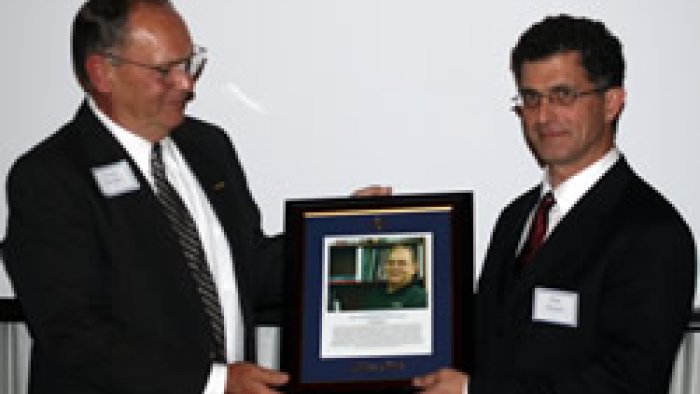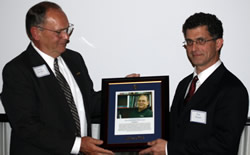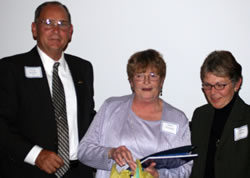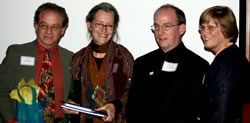
At a glance
Alfred State College Retirees Honored at Pioneer Dinner.

 Douglas J. Barber, Alfred State College class of 1966, was the "man of the hour" Saturday night (11/17) as he presided over the College's Pioneer Dinner, the official centennial kick-off event. But more than that, Barber was also the guest of honor as he received the Distinguished Alumnus Award which honors those graduates who have not only succeeded in their chosen careers, but have also succeeded as human beings...contributing to their communities as well as enjoying pleasurable pursuits for their own personal fulfillment and growth.
Douglas J. Barber, Alfred State College class of 1966, was the "man of the hour" Saturday night (11/17) as he presided over the College's Pioneer Dinner, the official centennial kick-off event. But more than that, Barber was also the guest of honor as he received the Distinguished Alumnus Award which honors those graduates who have not only succeeded in their chosen careers, but have also succeeded as human beings...contributing to their communities as well as enjoying pleasurable pursuits for their own personal fulfillment and growth.
Barber, a construction technology alumnus, laid the foundation of both his professional and personal lives at Alfred State where he earned his associate's degree, served as a faculty member and as dean, helped the construction programs attain TAC/ABET-accreditation, participated in the development of baccalaureate-level engineering technology courses, and cultivated relationships with area and regional businesses and alumni, resulting in donations for the engineering technology programs. He served as an evaluation team member for the Accreditation Board for Engineering and Technology, participated in American Society for Engineering Education conferences and in the Rochester Construction Specifications Institute. Outside the classroom, Doug established a construction company that helped build the village of Alfred; he served as a member of the Educational Foundation, the Crandall Hook and Ladder Volunteer Fire Department, and the Alfred 21st Century Group board of directors. He was a consultant for ASC/FEPADE, the Institute of Technology of Central America, El Salvador.
Doug says that his ASC degree "provided both breadth and depth of information" in his discipline. The program at that time (before the School of Applied Technology was born) provided more hands-on experience then, as well as a smattering of engineering techniques, problem solving, surveying, structural analysis, a peek into new areas in construction, and experience with the commercial side of building construction. The curriculum gave him basic experiences in manual skills, so when he began building houses on his own, he had the confidence to do it.
But there was a synergy there as well: when he returned to the classroom, he could incorporate his real-world experiences into his lessons. In fact, he created a "12-module program, with the help of a grant" which allowed him to put it on video, "where students, in a round robin fashion, participated in 12 varying aspects of construction, including soldering, welding, mixing concrete, electrical work, plumbing, masonry," and more. In 1981, Doug was honored by the ASC Alumni Association when they named him "Teacher of the Year" in his school.
"Alfred State College has been an integral part of my life since I was 18 years old. It allowed me to build a wonderful life with my wife Kay and our two kids (Krista and Kevin--his family has grown to include a son-in-law and two grandsons), and to be able to spend my retirement traveling to visit my family in far-flung parts of the globe and settle in Bradenton, FL. I am grateful for all that Alfred State College has given me, and believe in ‘giving back' to the community where we work and live."
Also honored that evening with Pioneer Awards which are given based upon years of service and creative and innovative contributions to the advancement of Alfred State College by a retired or former ASC employee, were David Conde, Barb Fletcher, Dr. Albert Vander Linde, and the late Era "Doc" Scofield.
 David Conde was one of the young faculty members in the early 1960s who helped create the Engineering Science Program, a two-year associate's degree, to transfer directly to upper level bachelor of engineering degree programs at Union and Clarkson Colleges in New York State. It was not until 1970 that any other associate degrees could transfer to upper level colleges, as they were terminal degrees.
David Conde was one of the young faculty members in the early 1960s who helped create the Engineering Science Program, a two-year associate's degree, to transfer directly to upper level bachelor of engineering degree programs at Union and Clarkson Colleges in New York State. It was not until 1970 that any other associate degrees could transfer to upper level colleges, as they were terminal degrees.
Additionally, Conde solicited tens of thousands of dollars in grants, gifts, and industrial support; obtained a grant to build the Internal Combustion Laboratory building as an addition to the Engineering Technology Building and raised the money to equip it as a state of the art ICE lab; was one of the founders of the Research Council of SUNY Colleges of Technology; utilized the ICE Lab in a research partnership with the Gleasman Corp. (Today's publicly traded company Torvec Inc., which remains a supporter of the College); obtained a grant in the area of HVAC, where he taught for a number of years; co-authored the textbook Modern Air Conditioning Practice with Norman C. Harris; and served as the Mechanical Engineering Department chair, from 1970-88. Under his guidance the programs received outstanding evaluations from ABET for both the associate and bachelor degree programs. While chair of the MET Department, Conde wrote the grant to purchase the Maho CNC milling machine and a Robotics Laboratory grant that purchased the department's first industrial robot. He received The SUNY Chancellor's Award for Excellence in Teaching, 1974-1975. He served as dean of the School of Engineering Technologies in 1989 until 1991. He was nominated by Gary Fraser, dean of the School of Engineering Technologies emeritus.
 Barb Fletcher has been a part of Alfred State since 1963, holding many positions in the Student Affairs Division. Fletcher served as director of housing for most of her tenure at Alfred State. She was instrumental in the rapid growth of residential life and in developing many of the programs associated with student life. Some of Fletcher's key accomplishments include: approval for the first co-ed residence hall at Alfred State (believed to have been the first co-ed hall in the SUNY System); opening of Braddon Hall and serving as its first dorm director; serving as the director of student activities; creating the first peer tutoring program; creating an Alcohol Awareness Program and obtaining a grant to continue this program; and serving as project director for "Operation Aware," a grant-funded initiative to encourage adults to enroll in non-traditional programs. In addition, Fletcher became the college's grant writer, worked as a counselor in the Counseling Center, and was deeply involved in a Rape Crisis Management program for the campus. Fletcher was also very community-minded, becoming one of the first women to join the Alfred Fire Department, eventually becoming an emergency medical technician as well as a fire investigator. She now works in the Mental Health Department at St. James Hospital in Hornell. She was nominated by Beverly Gilbert, secretary to the vice president of Institutional Advancement.
Barb Fletcher has been a part of Alfred State since 1963, holding many positions in the Student Affairs Division. Fletcher served as director of housing for most of her tenure at Alfred State. She was instrumental in the rapid growth of residential life and in developing many of the programs associated with student life. Some of Fletcher's key accomplishments include: approval for the first co-ed residence hall at Alfred State (believed to have been the first co-ed hall in the SUNY System); opening of Braddon Hall and serving as its first dorm director; serving as the director of student activities; creating the first peer tutoring program; creating an Alcohol Awareness Program and obtaining a grant to continue this program; and serving as project director for "Operation Aware," a grant-funded initiative to encourage adults to enroll in non-traditional programs. In addition, Fletcher became the college's grant writer, worked as a counselor in the Counseling Center, and was deeply involved in a Rape Crisis Management program for the campus. Fletcher was also very community-minded, becoming one of the first women to join the Alfred Fire Department, eventually becoming an emergency medical technician as well as a fire investigator. She now works in the Mental Health Department at St. James Hospital in Hornell. She was nominated by Beverly Gilbert, secretary to the vice president of Institutional Advancement.
Dr. Albert Vander Linde (who was unable to attend the event) joined Alfred State in 1978 as dean of the (then) Vocational Division of ASC. He used the subsequent14 years to move the fledgling campus into maturity.
Vander Linde's leadership fostered a unique relationship between the Educational Foundation of Alfred, Alfred State College, and the faculty and staff of the Wellsville campus. These efforts resulted in the following significant changes to the Vocational Technology campus now known as the Applied Technology campus:
Design, development, and construction of the Student Activities Center, which now also temporarily houses Building Trades laboratory work, which immediately impacted student life on the campus by greatly expanding student recreational opportunities; renovation of the former activities center into a new facility to house the newly renamed Food Service Department (Culinary Arts, as it is known today, immediately created a new baking, production & management degree, and a new focus on preparing graduates for employment in the fine dining aspects of the profession); expansion of the student dining room from a classroom to the currently used facility.
He also oversaw the design and construction of the Senior Automotive facility, allowing the Automotive Trades Department to add significantly to its enrollment, move the auto body refinishing and repair program into a facility that was triple the size of the previous one, and relocate the campus Physical Plant operation from the center of the campus to the outside edge, increasing its operational space.
With the old Physical Plant and Food Service facilities vacated, Vander Linde immediately sought funding to renovate those areas as a new campus library and classrooms for the growing Drafting Department. With those changes, Drafting became Drafting/CAD with three separate degree areas of specialization.
On a less glamorous note, many of the parking lots, which until this time had been gravel or dirt lots, were laid out and paved or chip sealed. Several were also added to accommodate the increasing enrollment.
All the while these campus enhancements were occurring, the faculty and staff led efforts to obtain national, state, and professional certifications and recognitions. Enrollments grew significantly, and set record numbers - some of which still stand.
The non-academic lives of students were not forgotten during Vander Linde's tenure. In addition to the construction of the Student Activities Center, he saw the ‘pilot' program in which Wellsville campus students were ‘permitted' to reside in the Alfred State residence halls. Prior to this, Wellsville students could live only in private housing in the area. Working with ACES, he initiated the bus service that continues to provide transportation for students between the two locations.
Dr. Vander Linde will always be known as a champion of the Wellsville campus. His vision, persistence, and diligence positioned the campus to best serve the thousands of students who have since walked the campus.
He was nominated by Craig Clark, interim vice president for Academic Affairs.
 Era "Doc" Scofield joined the faculty at Alfred State in September 1947, in what was then the Division of Science. Over the next 32 years, he taught general biology, histology, and anatomy and physiology.
Era "Doc" Scofield joined the faculty at Alfred State in September 1947, in what was then the Division of Science. Over the next 32 years, he taught general biology, histology, and anatomy and physiology.
From his earliest days on campus, he was involved with the development of student theatre. He functioned as the backstage manager as well as the director of most of the campus theatrical endeavors. He always toured with the budding thespians when they traveled.
In the early 1960s he was instrumental in establishing the Allegany-Steuben Science Teachers Association. In addition to the monthly meetings, he arranged to have an annual science fair and competition on campus for area high school students, firmly believing this was an important way to recruit the best science students into ASC programs.
During this same early period, he became concerned about the lack of sexual education among students. To that end, he developed what became known as "Doc's Sex Lectures." At a time when dorm mothers and sororities were an integral part of campus life, he would arrange to give these lectures in sorority houses, and later as part of orientation classes. In today's society, this whole concept would seem very naïve, but 50 years ago, it was a very innovative and necessary program.
Scofield developed the first histology course on campus. Since human tissue specimens were not available through biological supply houses, he would go to area hospitals and bring back human specimens, amassing an unbelievable collection. He felt the best way to learn about human tissues was to work with human organs.
When the Medical Services Department began teaching anatomy and physiology, Scofield, along with Professor Ronald Putnam, developed a complete audio tutorial 30-week laboratory sequence for the course. These labs were so innovative that seven other NYS campuses adopted this teaching methodology.
He and Professor Putnam also wrote a laboratory manual that was commercially printed for use in A&P courses. This manual was unique to the market in that it was specific for audio tutorial courses.
Doc Scofield died at age 86 in 2002; he was nominated by Art Gaisser, SUNY Distinguished Teaching Professor emeritus. Doc's children (Tom and Dan and Dan's wife, Pam) accepted the award on his behalf.
 Other highlights of the evening included remarks by ASC alumnus Erland ("Erkie") Kailbourne, '61, and ASC President Emeritus Dr. William D. Rezak, as well as the recitation of his original poem, "Crossing the Kanakadea," written especially for Alfred State College's centennial celebration, by Joseph Flynn, SUNY Distinguished Service Professor emeritus.
Other highlights of the evening included remarks by ASC alumnus Erland ("Erkie") Kailbourne, '61, and ASC President Emeritus Dr. William D. Rezak, as well as the recitation of his original poem, "Crossing the Kanakadea," written especially for Alfred State College's centennial celebration, by Joseph Flynn, SUNY Distinguished Service Professor emeritus.
